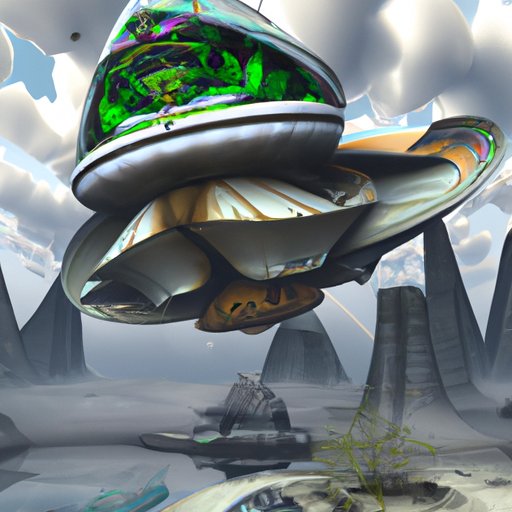Introduction
Science fiction is a popular genre of literature, film, and other forms of media that explore the relationship between humanity and science. It typically includes elements of fantasy and speculation, often set in alternative universes or distant futures. The genre continues to evolve as new technologies and ideas emerge, leading to an ever-growing range of stories, characters, and settings. In this article, we will explore the history, themes, and subgenres of science fiction, as well as its influence on popular culture.

Exploring the History and Evolution of Science Fiction
The origins of science fiction can be traced back to ancient myths and legends. Early works such as Homer’s Odyssey and Virgil’s Aeneid featured fantastical creatures and far-off lands, while Lucian’s True History told tales of interplanetary travel and alien civilizations. These stories laid the groundwork for later authors to explore more scientific concepts, such as space exploration and time travel.
In the 18th century, Mary Shelley’s Frankenstein blended horror with science, setting a precedent for future works of science fiction. Jules Verne and H.G. Wells were two of the most influential authors of this era, crafting stories that imagined the potential of technology and its implications for society. Their works, along with others, helped to popularize the genre and create the foundation for modern science fiction.
The development of science fiction was further propelled by advances in technology. The emergence of television, film, and radio allowed authors to tell their stories in new and exciting ways. Writers like Isaac Asimov and Arthur C. Clarke explored the possibilities of artificial intelligence and space exploration, while Ray Bradbury and Ursula K. Le Guin crafted tales of social commentary and dystopian societies. The rise of e-books and digital media has also enabled authors to reach wider audiences and experiment with different formats.
More recently, science fiction has become increasingly popular in mainstream culture. Films such as Star Wars and Avatar have become box office hits, while TV shows like Doctor Who and The Expanse have attracted millions of viewers. The genre has also had a major influence on video games, inspiring titles such as Fallout and Mass Effect. As technology continues to advance, so too will the science fiction genre.

Examining the Themes and Subgenres of Science Fiction
Science fiction is a vast and complex genre, encompassing a wide range of themes and subgenres. Common themes include exploration, technology, and the future. Stories often explore the implications of scientific and technological advancements, as well as the consequences of their misuse. Other popular topics include space travel, time travel, aliens, artificial intelligence, and post-apocalyptic worlds.
The genre also encompasses a variety of subgenres, each with its own distinct characteristics. Hard science fiction focuses on plausible scientific and technological concepts, while soft science fiction deals with social, political, and psychological issues. Cyberpunk is a subgenre that explores the effects of technology on society, while steampunk reimagines the past with advanced technology. Space opera is a type of adventure story set in outer space, while military science fiction focuses on warfare and conflict.
A Comprehensive Guide to Writing Science Fiction
Writing science fiction requires a unique blend of creativity, imagination, and technical knowledge. Before beginning a project, it is important to familiarize yourself with existing works in the genre. This can provide inspiration for your own story, as well as a better understanding of what makes good science fiction.
When crafting your own story, it is important to create a believable world and characters. Establishing the rules of your universe is critical to making your story believable. Consider the laws of physics, the limits of technology, and the potential consequences of your plot developments. Developing convincing characters is also essential, as they should be able to interact believably with their environment.

Investigating the Relationship between Science Fiction and Technology
Technology has always played an important role in science fiction. From early works such as Frankenstein to more recent films like Blade Runner, technology has been used to explore the boundaries between humanity and science. Many of the devices featured in science fiction stories have since become reality, from robotic assistants to self-driving cars.
Technological advances have enabled writers to craft more compelling stories. Virtual reality, augmented reality, and artificial intelligence are just some of the technologies being used to create immersive experiences. Robotics, nanotechnology, and genetic engineering have also been featured in many science fiction stories, providing new avenues for exploration and imaginative speculation.
Understanding How Science Fiction Imagines the Future
Science fiction has long been used to explore speculative futures. From utopian societies to dystopian nightmares, the genre has examined the potential implications of technology and social change. Authors have imagined a wide range of possible futures, ranging from the optimistic to the apocalyptic. These stories often serve as cautionary tales, highlighting the potential risks of unchecked progress.
Science fiction has also been used to explore social issues. Race, gender, class, and power dynamics are just some of the topics that have been examined in the genre. By imagining alternative realities, authors can challenge existing conventions and examine the implications of different social structures.

Analyzing Notable Works in the Science Fiction Genre
Throughout its history, science fiction has produced a number of classic works. George Orwell’s 1984, Aldous Huxley’s Brave New World, and H.G. Wells’ War of the Worlds are just some of the seminal novels in the genre. More recently, books such as Margaret Atwood’s The Handmaid’s Tale and Neal Stephenson’s Snow Crash have become bestsellers.
Many of these works have been adapted into successful films and television shows. Stanley Kubrick’s 2001: A Space Odyssey, Ridley Scott’s Blade Runner, and Steven Spielberg’s E.T. the Extra-Terrestrial are some of the most iconic science fiction movies of all time. Television series such as Battlestar Galactica, Westworld, and Black Mirror have also achieved critical acclaim.
Appreciating the Impact of Science Fiction on Pop Culture
Science fiction has had a profound impact on popular culture. Movies, television shows, and video games have all been influenced by the genre. The success of franchises such as Star Wars and Star Trek has led to an explosion of merchandise, from action figures to comic books. Science fiction has also inspired fashion trends, with clothing and accessories inspired by characters and stories.
Science fiction has also shaped public perceptions of technology. Its positive portrayal of technology has encouraged people to embrace new innovations, while its warnings of misuse have raised awareness of potential dangers. Science fiction has also provided a platform for examining social issues, allowing authors to explore the implications of different scenarios and challenge existing conventions.
Conclusion
Science fiction is a genre that has captivated readers for centuries. From early works of speculative fiction to contemporary blockbusters, the genre has evolved to reflect the changing landscape of technology and society. Its imaginative stories and beloved characters continue to inspire readers and spark conversations about our future. Through exploring its history, themes, and subgenres, we can gain a deeper appreciation for the science fiction genre.
(Note: Is this article not meeting your expectations? Do you have knowledge or insights to share? Unlock new opportunities and expand your reach by joining our authors team. Click Registration to join us and share your expertise with our readers.)
